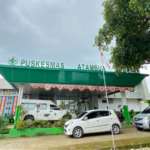
Limitation is not an Obstacle: South Atambua Public Health Centre Strategy to End LFU
June 6, 2024CST Approaches, PLHIV Health Improves
Antiretroviral Therapy is one of the Care, Support, and Treatment (CCT) service programs crucial for the health of PLHIV. The quality of life of PLHIV depends on the availability of ARV medicine in health services. However, not all PLHIVs have easy access to PDP services due to the distance from the service. Therefore, bringing PDP services closer to several health centers for easy access is an effective way to overcome this obstacle.

Patners with HIV who access CST service in Wedomu Public Health Centre
In one of the hamlets in Manleten Village, Belu Regency, approximately 11 km from Atambua city center, a married couple with the initials H and A have three children. The family lives in a simple 3 x 4 m2 house. In 2014, H became ill and was diagnosed as HIV positive by a doctor at Atambua General Hospital. The doctor suggested that his wife also have a blood test, and the result was also HIV positive.
At that time, they felt down and hurt. Questions arose in their hearts: where did HIV come from? How did they get infected, and who brought the virus into their lives? Although they were at their lowest point in life, their love and commitment to be together was so strong that they remained faithful and cared for each other.
Since 2014, they have had to take ARVs and regularly check their health conditions at Atambua Regional Public Hospital. At that time, in the Belu District, the Care, Support, and Treatment (CST) services were only centralized at the local government hospital, forcing them to travel long distances to access ARVs.
Over time, in 2021, the couple met with CD Bethesda YAKKUM and began participating in Peer Support Group activities. They often engage in joint KDS activities at the health center, sub-district, and district levels. Through these activities, many benefits are received from getting to know each other, supporting, and networking with people from the government and the private sector who support PLHIV. Many understandings about HIV and AIDS and the importance of adherence in taking ARVs have been received, which has made those who were initially closed off slowly begin to open up. Furthermore, they gained the confidence and courage to live as PLHIVs who can socialize and work anywhere and anytime.
At the end of 2022, during an activity with the KDS, H was informed that there would be a CST service at the nearby Wedomu Public Health Centre. Hearing this, they were pleased and hoped that they could routinely access ARVs easily without having to pay for transportation costs to take drugs every month at Atambua Regional Public Hospital. So far, they are often late in taking ARVs for about 1-3 days due to the high transport cost. When there is a delay in taking ARVs, they complain that they often feel tired at work, but no other severe symptoms are felt.
Since 2023, Wedomu Public Health Centre has been implementing CST services and is equipped with an AIDS Team. Program managers and doctors are friendly with PLHIV and willing to listen to their complaints. The AIDS team and doctors at Wedomu Public Health Centre routinely conduct HIV tests and assist PLHIV.
H and his wife currently access ARVs at the Wedomu Public Health Centre, less than 2 km from their house. Since there is a CST health center in a relatively close location, H and A feel very helpful, and they are no longer late in taking ARVs every month. Until now, they have complied with taking ARVs so that their health condition is well maintained. Body weight is relatively stable, at 39 kg for the wife and 50 kilograms for the husband. After there is no delay in taking ARVs, they do not feel tired quickly like before. They can do their routine activities well, such as rice farmer who believe that by taking ARVs regularly, their health will be maintained, and HIV will not be easily transmitted to others. They think that we must STOP HIV!
(Almada Lasi)




